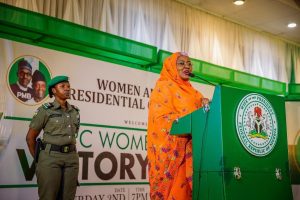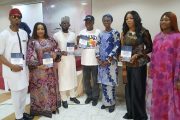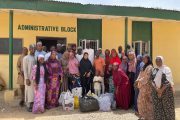The controversy over the achievement status of Nigeria’s flagship safety net intervention – the National Social Investment Programme, (N-SIP) – may be far from being laid to rest. Recent criticism of its performance status by a politically well located voice has brought it to the front row in the national public sphere. But now, ActionAid whose self-understanding is a global movement of people working together to further human rights and defeat poverty by working with the poor and the excluded is rolling up the sleeves by indicating the position that the N-SIP is contributing in addressing the problems of out-of-school children and youth unemployment in Nigeria. The Nigerian office of the anti-poverty campaigner said in a statement by Ene Obi, the Country Director, that it knows the programmes are impacting on the lives of Nigerians albeit at different levels. Not only does it believe this to be the case but also that more Nigerians can be reached if the voted funds are released. Declaring the intentions to be good, Obi commends “the highly competent technical staff of the NSIO led by Mrs. Maryam Uwais for the job done so far”.

Ene Obi, Country Director, Action Aid Nigeria
 The statement said that ActionAid Nigeria (AAN) has been following the comments and thoughts of concerned Nigerians on the implementation of the N-SIP in Nigeria. With support from The U.K. Department for International Development (DFID) Partnership to Engage, Reform and Learn (PERL) and Ford Foundation, it says it has coordinated Civil Society bodies from the 35 States (except Ekiti state that had problems with funds transfer) and the FCT, to independently monitor, evaluate and report findings based on the implementation of three out of the National Social Investment Programmes (N-SIP) namely: N-Power Programme, Home-Grown School Feeding Programme (HGSFP) and the Government Enterprise and Empowerment Programme (GEEP).
The statement said that ActionAid Nigeria (AAN) has been following the comments and thoughts of concerned Nigerians on the implementation of the N-SIP in Nigeria. With support from The U.K. Department for International Development (DFID) Partnership to Engage, Reform and Learn (PERL) and Ford Foundation, it says it has coordinated Civil Society bodies from the 35 States (except Ekiti state that had problems with funds transfer) and the FCT, to independently monitor, evaluate and report findings based on the implementation of three out of the National Social Investment Programmes (N-SIP) namely: N-Power Programme, Home-Grown School Feeding Programme (HGSFP) and the Government Enterprise and Empowerment Programme (GEEP).
Monitoring in 70% of the Local Government Areas in all the states (except Kano state where the exercise was carried out in 18 LGAs) at varying times between May and December 2018 and interacting with over 2 million Nigerians (beneficiaries and non-beneficiaries) of the three programmes, it said showed “clear evidence of meals provided in primary schools through the Home-Grown School Feeding Programme (HGSFP)”.
This resulted in more pupils going to school, improved concentration of pupils during classroom teaching, reduction in absenteeism, and in some cases reduction in the rate of illness among pupils as reported by headteachers, parents and pupils in the communities visited, AAN added. Specifically on the N-Power Programme, Government officials at state levels heading the Places of Primary Assignments/sites generally, confirmed the added value that beneficiaries of the programmes brought to their schools, Primary Healthcare Centres (PHC), agricultural establishments, and offices, said the statement. According to AAN, the monitoring exercise also confirmed that schools that were in critical need of teachers got beneficiaries to teach through the N-Power programme, and other non-teaching establishments also gained trained labour to add to their existing workforce.

Mrs Mariam Uwais, N-SIP anchor person in a cropped picture from Channels Television
 Zooming on Adamawa State, for instance, the statement mentioned how the CSO involved in conducting monitoring reached over 100 wards in 15 selected LGAs viz Yola North, Yola South, Girei, Gombi, Hong, Michika, Madagali, Mubi North, Mubi South, Maiha, Guyuk, Lamurde, Numan, Demsa, Jada) In Kano State, areas reached were 18 selected LGAs: Nassarawa, Minjibir, Ungogo, Dambatta, Bichi and Karaye, Kano Municipal, Gwale, Kumbotso, Tarauni, Gwaro, Kabo, Dala, Sumaila, Wudil, Gaya, Ajingi and Rano.
Zooming on Adamawa State, for instance, the statement mentioned how the CSO involved in conducting monitoring reached over 100 wards in 15 selected LGAs viz Yola North, Yola South, Girei, Gombi, Hong, Michika, Madagali, Mubi North, Mubi South, Maiha, Guyuk, Lamurde, Numan, Demsa, Jada) In Kano State, areas reached were 18 selected LGAs: Nassarawa, Minjibir, Ungogo, Dambatta, Bichi and Karaye, Kano Municipal, Gwale, Kumbotso, Tarauni, Gwaro, Kabo, Dala, Sumaila, Wudil, Gaya, Ajingi and Rano.
Bringing over 55, 000 beneficiaries and non-beneficiaries within its consultative reach in both states through this process, AAN said over 70% of beneficiaries interviewed in Adamawa State believed that the programme had impacted positively on their lives, the positive impacts being access to monthly stipend and trainings. “An N-Teach beneficiary at Government Day Junior Secondary School, old GRA of Alkalawa Ward, said he could develop a lesson plan as well as a scheme of work which he could not do prior to enrolling in the programme. Also, schools visited in the communities in Kano State reported decreased illness among pupils, and teachers in charge of first aid reported that request for medications had declined”, it was stated.
Although declaring that there is a lot that can be improved upon, AAN’s interpretation of its data is that the programme is laudable. One specific room for improvement is the release the amount that is voted for the N-SIP. Furthermore, it is insisting that, on GEEP, there is need for system strengthening and public enlightenment for the programme to gain more ground with the citizens.
As a credible international NGO, AAN’s conclusion and standpoint based on research findings cannot be dismissed. Neither can the position of the most blunt critic of N-SIP, Aisha Buhari be waived away given her location in Nigeria’s ‘hierarchy of credibility’ at the moment and in the context of the thunderous ‘No’ to her rhetorical question to an audience in Katsina State recently. So, who might be speaking the truth on this?




























